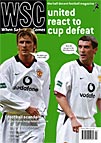 Although they have another season in the top flight secured, Manchester City could be in for a troublesome summer in the boardroom. Ian Farrell investigates
Although they have another season in the top flight secured, Manchester City could be in for a troublesome summer in the boardroom. Ian Farrell investigates
With an aggregate derby win helping to ensure Premiership survival before the spring, all but the most optimistic Manchester City fans can be more than content with their return to the big time. Signing Robbie Fowler at a knockdown price to partner the low-maintenance goal machine that is Nicolas Anelka would seem to be another great plus. However, the deal’s complications have cast doubt over whether it will ultimately prove a positive or a negative for the club. Their true effect on Kevin Keegan’s relationship with David Bernstein, once the rock-solid chairman he always seems to need, is the major concern.
Bernstein took full control in 1998 with a mission to rescue the club from debt and an image shared at times with Ratners, Nick Leeson and Group 4. He brought to MCFC the business acumen he’d demonstrated as head of FCUK and a softly spoken ambition, typified by Keegan’s appointment. After 18 months of rapid progress it seemed a perfect partnership.
The first cracks appeared last autumn. After painstaking negotiations, Bernstein sealed a major deal with the American investment bank Bear Stears for an initial £30 million against a percentage of future gate receipts. To Keegan’s frustration, the chairman made it clear that, with debts mounting, plans for the money did not include mid-season bulk buying. One major signing and that would be it.
When the initial deal for Fowler failed, Keegan blamed himself for not being persuasive enough. He soon learned the facts, though: the second thoughts had been Bernstein’s, not Fowler’s. Long-term fitness concerns had prompted an attempt to restructure the deal on an appearance-dependent basis. Leeds were not impressed, Fowler felt slighted and Keegan’s one big deal was off.
As split rumours (fuelled by vice-chairman John Wardle’s new middle-man role) began to grow, Keegan tellingly gave his support to the under-fire Mohamed Fayed. He was his idea of a “great chairman”, presumably in the same way that a child’s idea of a great parent is one who would buy them a PS2 rather than pay the gas bill. Like most managers, Keegan’s view of football finance is fairly basic and appeals to fans – spending your money on the team brings success which brings money – and any reticence from the board immediately arouses his suspicions.
As a former head of the Pentland Group – one of few sportswear companies actually praised by Amnesty International in its recent report on Asian sweatshops – and an active chairman of the Jewish community’s charitable sports association Manchester Maccabi, Bernstein is no ultra-ruthless bean counter. Unfortunately, Keegan doesn’t seem to need one to feel that he is being compromised.
A mixture of the manager’s tenacity and Leeds’ desperation reignited the transfer, at a lower price and with the contentious long-term payment plan in place, but the damage was done. The deal had created problems, amplified others and broadcast the whole thing to a media waiting to laugh. The assurances of boardroom solidarity came thick and fast, but the recent resignation of co-managing director Chris Bird, a major player in City’s resurrection and an advocate of a speculate-to-accumulate approach, tells its own story. There are worries that the schism between Bird and JD Sports magnate Wardle on one side and Bernstein and finance director Alistair Mackintosh on the other over spending policy could start a damaging civil war.
The manager-chairman relationship is not yet in the Venables-Ridsdale mould. These two principled men still have a mutual respect, but if the situation worsened, it would be interesting to see how hard the club worked to keep their messiah. He did City a huge favour by taking over, saving them from a Dave Bassett, but with (some) money to spend and a wonderful new stadium, they would have little trouble in finding a major successor. Keegan’s own achievements have helped to raise the club’s standing, to the point where he may need City more than City need him.
Were he to walk there is no doubt as to whose side the people would be on, but the Fowler transfer should have rammed home what can happen when a “fan” chairman gets carried away and indulges an ambitious manager. Like most clubs, just a few wrong decisions could see them as the victim, not the beneficiaries, of next year’s January sales.
From WSC 194 April 2003. What was happening this month